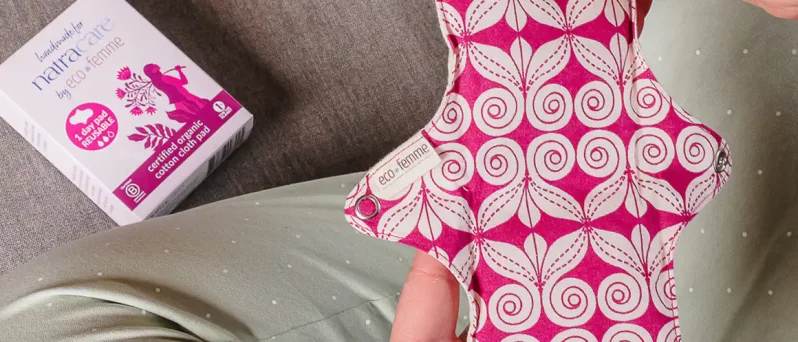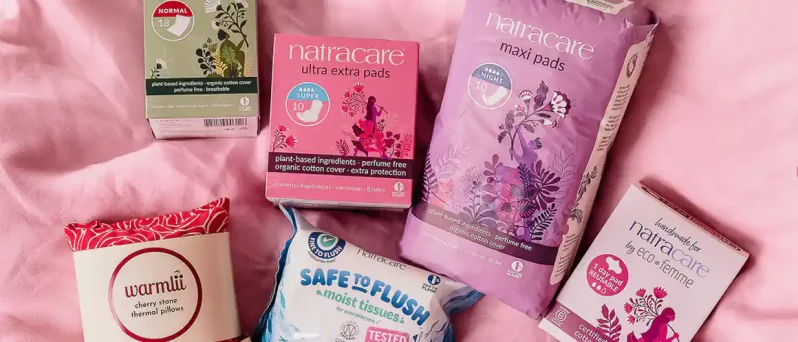From July 2021, all disposable period products in the European Union will need to display a “Plastic in Product” logo, even those which contain 0% oil-based plastics. The new ruling by the European Commission is part of the Single Use Plastic Directive1 tackling the top polluting products on Europe’s beaches, including other materials such as fishing gear, drinks cups, plastic wet wipes, and cigarette filters.
For menstrual products, the Single Use Plastic Directive does not differentiate between products containing petroleum plastics or plant-based plastics, meaning that even a product which is certified as compostable will still need to display the logo.
The “Plastic in Product” logo appears to feature a dying turtle. The logo will need to appear on all menstrual products sold in the EU under the new directive, even those which are petroleum free, causing serious communication problems for period brands trying to offer biodegradable alternatives.
Period products have a huge polluting potential, with most menstrual pads typically containing 90% plastic2, or the equivalent of 5 plastic carrier bags of plastic in a pack3. Zero Waste Europe reported that more than 49 billion units of menstrual products were consumed in 2017 by the 28 member states, generating 590,000 tonnes of waste4. The tendency for people who menstruate to flush period products has been an issue for beach pollution, and they are one of the most common causes for blocked drains5.
For brands such as Natracare who offer period products made with compostable and renewable materials6, this regulation means very conflicting messages for consumers.
“Our products proudly carry an independent “Plastic Free” certification, meaning they contain no petroleum-based plastic. So, to have another conflicting logo next to it, forced by this new directive, is very confusing for our customers.” – Susie Hewson, founder and director of Natracare.
Hewson’s stance is supportive yet frustrated by the regulation: “This was a rushed publication, and it seems that the issue of biodegradable plastics has not been adequately considered. As a business rooted in sustainability, we truly support the aims of the directive, but it is our view that this approach will not incentivise oil-based plastic brands to move to more ecological materials.”
Hewson and others have been trying to lobby the European Union to consider the impact on brands offering ecological alternatives, but for the moment, there has been little sign of movement or attention for brands like Natracare.
Many are asking what the situation is here in the UK7. The UK government is not obliged to follow the Single Use Plastics Directive, except for Northern Ireland which may need to adopt the policies under the Northern Ireland protocol. However, the four nations are each deciding how to next take measures against plastic pollution.
References
- European Union – Commission guidelines on single-use plastic products in accordance with Directive (EU) 2019/904 of the European Parliament and of the Council on the reduction of the impact of certain plastic products on the environment.
- Natracare – Why Natracare Natural Materials.
- WEN – Environmenstrual.
- Natracare, 2019 – How Much Plastic is in Period Pads?.
- Zero Waste Europe, 2020 – Single-use Menstrual Products, Nappies and Wet Wipes, [PDF].
- AlloDébouchage – WC et toilette bouché : 10 causes fréquentes !.
- Vegware, 2021 – The UK & the EU Single Use Plastics Directive.
Notes to editors
Natracare is the first company in the world to provide plastic-free, certified organic cotton tampons and totally chlorine-free menstrual pads and panty liners. Natracare products are biodegradable and can even be composted. Susie Hewson created the brand in 1989 in response to the growing danger to human health and the environment from dioxin pollution in the pulping industries with the chlorine bleaching of paper products.









